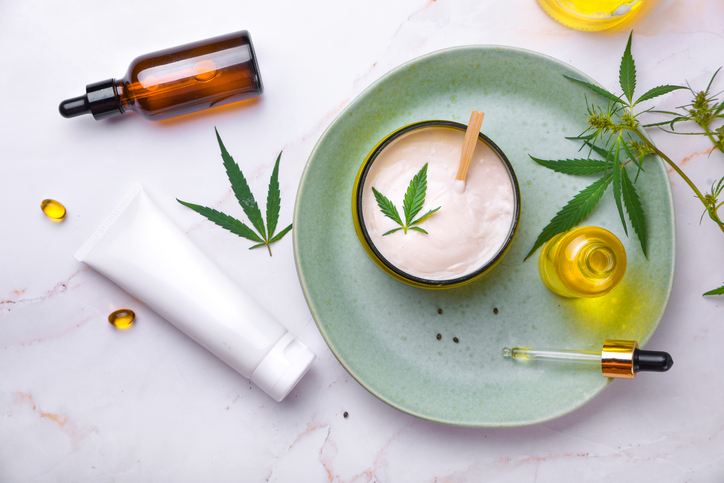Key Takeaways
- CBD edibles’ benefits for arthritis include pain relief, anti-inflammatory effects, and improved physical function and sleep.
- Due to potential side effects and medication interactions, start with a low dose and consult a healthcare provider.
- CBD, used as a complementary treatment for arthritis, may improve various symptoms and reduce reliance on other medications.
Arthritis is a condition characterized by inflammation of the joints, causing pain and stiffness that can worsen with age. It is a common ailment, affecting millions of people worldwide, with the Centers for Disease Control and Prevention (CDC) estimating that about 54 million adults in the United States have some form of arthritis.
A survey conducted by NuggMD revealed that arthritis is the most common condition for patients aged 55-73 seeking treatment with cannabis. Adults widely use cannabidiol (CBD) for symptom relief, including CBD gummies for arthritis and pain.
There is no doubt CBD products are popular. But does CBD help with arthritis symptoms, according to research?
What is Arthritis?
Arthritis affects the joints, causing symptoms such as pain, swelling, stiffness, and decreased range of motion. Arthritis encompasses more than 100 joint disorders, with osteoarthritis and rheumatoid arthritis being the most common forms.
Osteoarthritis is a degenerative joint disease where the cartilage that cushions the ends of bones wears down over time, leading to pain and stiffness. Rheumatoid arthritis is an autoimmune disorder where the immune system mistakenly targets the lining of the joints, causing inflammation and pain.
Arthritis symptoms typically include joint pain, stiffness, swelling, and decreased range of motion. Risk factors for arthritis can include age, family history, previous joint injuries, and obesity.
Traditional treatments for arthritis focus on relieving symptoms and improving joint function, often involving medications, physical therapy, lifestyle changes, and sometimes surgery. Patients frequently rely on anti-inflammatory medications, acetaminophen, and opioids to manage pain.
Arthritis has no cure, but treatments, including CBD, can manage the condition and improve patients' quality of life.
Benefits of Using CBD for Arthritis

The non-intoxicating cannabinoid CBD may help manage arthritis symptoms. Its potential therapeutic benefits include anti-inflammatory, analgesic (pain-killing), and anxiolytic (anxiety-reducing) properties.
The many products available, including flower, vapes, tinctures, topical CBD creams, and CBD gummies for arthritis, offer patients options.
A recent research survey found CBD use was associated with improvements in pain, physical function, and sleep quality among arthritis patients. Eighty-three percent of the participants reported pain relief, with those suffering from osteoarthritis experiencing the most significant improvements. Additionally, many patients reduced or ceased other medications, including nearly 19% who discontinued opioids after using CBD.1
Concern over long-term opioid use prompts many people living with arthritis to look for alternative sources of relief. Many arthritis patients rely on skin creams or topicals to ease aching joints.
In a clinical trial of patients with basal thumb joint arthritis, the twice-daily application of CBD cream significantly improved patient-reported pain and disability. This method of applying CBD skips the initial breakdown in the liver, which can lead to better absorption and more consistent effects.2
Why Does CBD Work Well for Arthritis?
CBD's anti-inflammatory and pain-relieving effects come from its interaction with the endocannabinoid system (ECS).
CBD inhibits the enzyme fatty acid amide hydrolase (FAAH), increasing levels of anandamide, an endocannabinoid that binds to cannabinoid receptors and reduces pain perception and inflammation.3 Additionally, CBD can interact with the CB1 and CB2 receptors through various pathways, providing pain relief and anti-inflammatory effects without the intoxicating side effects associated with THC.
The anti-anxiety action of CBD acts on non-cannabinoid receptors, too, offering treatment for the depression that can accompany chronic illness.4
CBD and Arthritis: Are There Any Risks?
While CBD is generally considered safe, it is not without potential side effects. In a study examining CBD use among arthritis patients, 41% reported experiencing at least one side effect. Most side effects were mild, including dry mouth, drowsiness, and changes in appetite. However, some users reported more severe effects, such as dizziness and digestive issues.1
Interactions with other medications are another consideration. Using CBD gummies for pain, for example, passes through the digestive system and liver. CBD can inhibit cytochrome P450 liver enzymes involved in drug metabolism. This interaction can alter the effectiveness of other medications, particularly those used to manage arthritis, such as NSAIDs and corticosteroids.5
Topical applications, like a CBD rub for pain, do not involve the gastrointestinal system and can be used without interactions.2 Consult with a healthcare provider before starting CBD to ensure it is safe and appropriate for your specific situation.
CBD as a Treatment for Arthritis

Arthritis treatments vary based on the severity of symptoms and the patient’s health profile. CBD, used as a complementary treatment for arthritis, may improve various symptoms and reduce reliance on other medications. Patients can take CBD-based products orally, like CBD gummies for arthritis, applied to the skin as CBD cream for arthritis pain, or inhaled through methods like pre-rolls or dabs.
In research studies, CBD use improves pain relief, physical function, and sleep quality among arthritis patients. Specifically, 83% of users reported reduced pain, 66% noted better physical function, and another 66% experienced enhanced sleep quality. Patients with osteoarthritis report more significant pain reduction compared to those with rheumatoid arthritis or other autoimmune arthritis conditions.
One of the notable findings from this research is the substantial number of patients who reduced or even stopped using other medications after starting CBD. Overall, 60.5% of respondents decreased or discontinued their other medications, with the highest reduction seen in osteoarthritis patients (66.2%), followed by those with rheumatoid arthritis (56.3%) and other autoimmune arthritis types (53.7%).
Additionally, longer-term use of CBD leads to higher rates of medication reduction, with patients using CBD for more than three years being 3.6 times more likely to cut back or stop other treatments compared to those using it for less than 30 days. Medication tapering can be particularly beneficial for patients looking to minimize the side effects or interactions associated with their current medication regimens.1
Tips for Using CBD for Arthritis
Getting started with CBD should begin with a medical consultation with a healthcare professional, especially if you are taking other medications.
The Arthritis Foundation advises patients to start with a low dose of CBD and gradually increase it until they achieve symptom relief.3 This "start low, go slow" method helps minimize potential side effects and reach an optimal dosage for individual needs.
To use CBD safely and effectively for arthritis, start with a low dose. With oral products like tinctures or gummies, start with 2.5mg to 5mg of CBD. Increase the dose by 2.5 to 5mg over several days to achieve desired symptom control. For inhaled products like vapes, use one inhalation and wait 15 minutes. Then, increase by one inhalation every 15-30 minutes. Physicians recommend a maximum dose of 1,500mg CBD per day.6
The best CBD for joint pain relief is the one that works for the patient, their condition, and their lifestyle. Consider using a combination of CBD products, such as homemade edibles for systemic relief and a CBD rub for pain. Consistency is key; regular use of CBD, rather than occasional use, may yield better long-term benefits.
Ask a Budtender: Which CBD Products are Best For Arthritis?

Patients can explore a variety of products to find the best CBD for joint pain relief. In addition to product categories, like CBD creams or THC and CBD gummies for pain, the market includes specialty products, like bath bombs or CBD beverages.
For medical use, arthritis patients favor formulations that provide consistent relief and bioavailability.
Balanced 1:1 ratio products blend CBD and THC, which can enhance pain relief and anti-inflammatory effects without causing significant euphoric effects.
Nano-emulsion products offer better absorption or bioavailability, allowing more active CBD to enter the bloodstream.3 The process converts the oil-loving CBD into a water-based solution for more rapid absorption.7
When purchasing CBD products for arthritis, look for high-quality products that have been third-party tested for purity and potency. A Certificate of Analysis, made available from the manufacturer, ensures that the product contains the advertised amount of CBD and is free from contaminants.
Effective dosing for CBD can vary, but a standard recommendation is to begin with a low dose and gradually increase. For example, a dose of 2.5mg to 5mg of CBD, taken 1-2 times daily, is often recommended. For nighttime pain or difficulty sleeping, a starting dose of 2.5 mg of THC may be beneficial.
Dosage may be increased every few days, not to exceed a maximum of 1,500mg of CBD per day.6 Consult a healthcare provider to tailor the dosing and monitor for potential interactions with other medications.
In conclusion, while CBD shows promise as a treatment for arthritis, it should be used carefully and under the guidance of a healthcare provider. Ongoing research will continue to explore how to incorporate CBD effectively into arthritis management, providing guidance for improved pain relief and quality of life for those affected by all forms of arthritis.
References
- Frane N, Stapleton E, Iturriaga C, Ganz M, Rasquinha V, Duarte R. Cannabidiol as a treatment for arthritis and joint pain: an exploratory cross-sectional study. Journal of Cannabis Research. 2022;4(1). doi:https://doi.org/10.1186/s42238-022-00154-9 ↩︎
- Heineman JT, Forster GL, Stephens KL, Cottler PS, Timko MP, DeGeorge BR. A Randomized Controlled Trial of Topical Cannabidiol for the Treatment of Thumb Basal Joint Arthritis. The Journal of hand surgery. 2022;47(7):611-620. doi:https://doi.org/10.1016/j.jhsa.2022.03.002 ↩︎
- de Almeida DL, Devi LA. Diversity of molecular targets and signaling pathways for CBD. Pharmacology research & perspectives. 2020;8(6). doi:https://doi.org/10.1002/prp2.682 ↩︎
- Lowin T, Schneider M, Pongratz G. Joints for joints: cannabinoids in the treatment of rheumatoid arthritis. Current Opinion in Rheumatology. 2019;31(3):271-278. doi:https://doi.org/10.1097/BOR.0000000000000590 ↩︎
- Huestis MA, Solimini R, Pichini S, Pacifici R, Carlier J, Busardò FP. Cannabidiol Adverse Effects and Toxicity. Curr Neuropharmacol. 2019;17(10):974-989. doi:10.2174/1570159X17666190603171901 ↩︎
- MacCallum CA, Russo EB. Practical considerations in medical cannabis administration and dosing. European Journal of Internal Medicine. 2018;49(49):12-19. doi:https://doi.org/10.1016/j.ejim.2018.01.004 ↩︎
- Jelínek P, Roušarová J, Ryšánek P, et al. Application of Oil-in-Water Cannabidiol Emulsion for the Treatment of Rheumatoid Arthritis. Cannabis and cannabinoid research. 2024;9(1):147-159. doi:https://doi.org/10.1089/can.2022.0176 ↩︎
The information in this article and any included images or charts are for educational purposes only. This information is neither a substitute for, nor does it replace, professional legal advice or medical advice, diagnosis, or treatment. If you have any concerns or questions about laws, regulations, or your health, you should always consult with an attorney, physician or other licensed professional.




